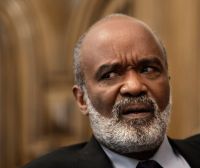Dialogue and Democracy
 The importance of dialogue is a topic that recently sworn in President Rene Preval has raised repeatedly. Haitians are masters of the gift of gab....talking, joking, arguing, debating. But what is the difference between a conversation and a dialogue? Both are ongoing...perhaps a dialogue is a conversation in search of a resolution.
The importance of dialogue is a topic that recently sworn in President Rene Preval has raised repeatedly. Haitians are masters of the gift of gab....talking, joking, arguing, debating. But what is the difference between a conversation and a dialogue? Both are ongoing...perhaps a dialogue is a conversation in search of a resolution.
Haiti's history is both compelling and traumatic. There is a scorched earth mentality when it comes to politics which makes coalition building and consensus very difficult to achieve. Haiti is riven by divisions and the tendency is to focus on what is different rather than what is similar.
How then to foster dialogue? Transparency is key as is inclusion. There are several important steps that could be taken to do so:
1) We have consistently advocated for the broadcasting of parliamentary sessions over the radio - TV is accessible only to a select few, but radio coverage saturates the country. Think of it as "H-Span".
2) Prioritize women - Women are holding Haiti together, and have a right to be equal stakeholders in any discussion on Haiti's future. Sadly, many times I have seen men unwilling to listen to women in forums for discussion. Qualified women need to be appointed to government posts. Tapping the Diaspora is one mechanism for doing so.
3) Address the public often - Chavez and other political leaders have scored popularity points by hosting "Hello President" addresses each week. Preval should address the Haitian people each week over the radio. Tackle the tough issues. Be up front with the Haitian people. We all know that things will not change overnight, let people know why this is, and what needs to be done to make lasting change. Tell them that they can make a difference, but more than that, let them know how. "Naje Pou Soti" (swim to get out) didn’t go over so well the last time Preval mentioned that......tell them what they can do to get out. Tell them how you will help them.
4) Institute open forums - Government representatives should participate in open forums with the constituents. Most Haitians might maybe possibly see their representatives when elections roll around, but then they disappear into air conditions offices. Key officials should be expected to address the public and to speak to journalists on a periodic basis. Haiti is traditionally a very dangerous country to be a journalist. Many have died for speaking out against corruption.....they should be protected and it must be made clear that there will be a "zero tolerance" policy for harassing journalists.
5) reform the justice system - They say when you’ve hit the floor, there is nowhere to go but up. Haiti's judicial system is broken. I wish I could say what needs to be done to reform it, but I am no lawyer. I invite people's thoughts on how the judicial system can encourage the rule of law without preference to the powerful and wealthy as has historically been the case. Jean Dominique's unresolved case is proof of the need for future reform.
There are, of course, other steps that could be taken. These are only a few. Haiti Innovation invites you to blog on ways in which a dialogue can be fostered....without it, a participatory democracy will not be possible.
Bryan
Add new comment